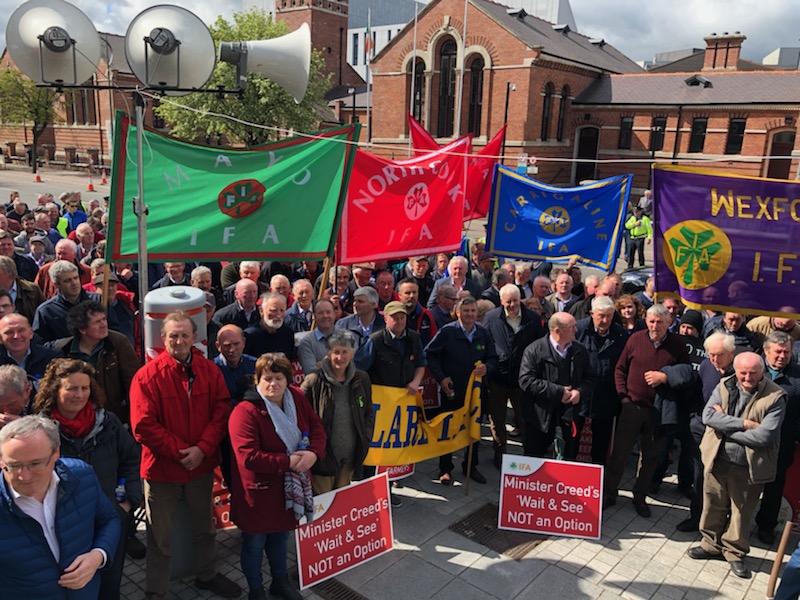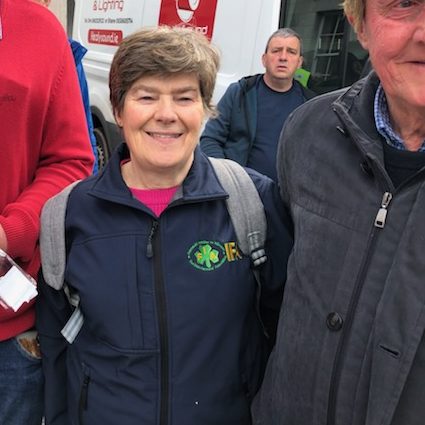Close to 1,000 members of the Irish Farmers’ Association (IFA) gathered outside Cork City Hall today, Wednesday, May 1, to protest in opposition to the Government’s “lack of action” to protect the beef sector from Brexit.
AgriLand attended the protest and spoke with some of the people involved to see why they are frustrated with the current situation in the beef sector.
Anne Mitchell
Chairperson of Galway IFA Anne Mitchell outlined: “We have been losing €200 to €300/head for our cattle and no other sector in Ireland could be expected to live in them circumstances.
“The average beef farmer has an income of €7,000. If that farmer was on social welfare, he or she would have an income of €13,000 – plus a range of benefits. We are working 16-18 hours a day for an income of €7,000.
“It is not sustainable and we cannot survive on it and the people of the world must realise that the hand that milks the cow, and turns the plough, feeds the world. People must realise that we cannot be done without.”
Imelda Walsh
Chairperson of north Tipperary IFA, Imelda Walsh, said: “We’re here today because livestock farmers are on their knees.
“This didn’t just happen today, this happened almost three years ago when the UK voted to leave the EU.
“As farmers, we have had enough. We have seen, over the last six months in particular, where livestock farmers have been completely decimated.
“I hear ministers talking today about issues, we haven’t an issue; we have a problem. I hope that ministers are finally going to do something.
I’m sick of hearing that it’s an EU decision. This is something for our Government. They have to recognise that farming is the backbone of this economy and it was during the recession.
“We are sick of the Government’s ‘wait and see’ approach. It’s time for the Government to go and actually back farmers and get the support farmers need to survive.”
John ‘The Boiler’ Murphy
Wexford IFA’s Grain Committee chairman, John ‘The Boiler’ Murphy, said: “We’re here in support of the beef farmers. This beef thing has gone pear shaped for over a year now.
“Last May prices started to really fall and it’s being put down to Brexit. We’re here pushing the Government who have said there is compensation in Europe; but they haven’t released it.
A total of €100 million has been lost by beef farmers as a result of Brexit.
“It would stabilise the beef industry in Ireland. The industry is massive and forms part of Ireland’s biggest exports and yet they’re letting it go down the tubes.
“We will be pushing for this until it comes; there’ll be no stop to it.”
Nigel Renehan
Nigel Renehan regional chairman for Ulster and north Leinster said: “I’m here to support Irish beef farmers who are absolutely on their knees and the Government is in denial of it.
“The reality is we need money to support the farmers who are the backbone of the rural countryside and they’re neglecting us and the rural countryside by not supporting us.
“My message to the Government is: ‘Either shape up and support the farmers or get out and let somebody else in that’s fit to do the job’.”
Elizabeth Ormiston
Chairperson of Cavan IFA, Elizabeth Ormiston, said: “I traveled to Cork today to fight for our rights as beef farmers. Our livelihoods are in tatters here and we are absolutely ruined.
“They’re talking about Brexit and having money in place for Brexit; but it has happened as far as the Irish beef farmer is concerned.
“We’re down €101 million for the last year. Our incomes are on the ground and we need help and we need it now.”
Ormiston outlined that, on behalf of the IFA, she has also recently been lobbying the European Commissioner for Agriculture and Rural Affairs, Phil Hogan, regarding a Brexit support package.
John Curran
The chairman of the Meath IFA branch, John Curran, said: “I’m here to represent the beef farmers and farming families who have been suffering losses incurred to their enterprises as a result of the beef trade.
“Farmers, including myself, have lost up to €180/head on each animal that they have sold. That amounts to thousands of euros of family farm incomes.
“We are looking for retrospective payments for the losses that have been incurred over the last six months due to Brexit-related issues,” he said.






